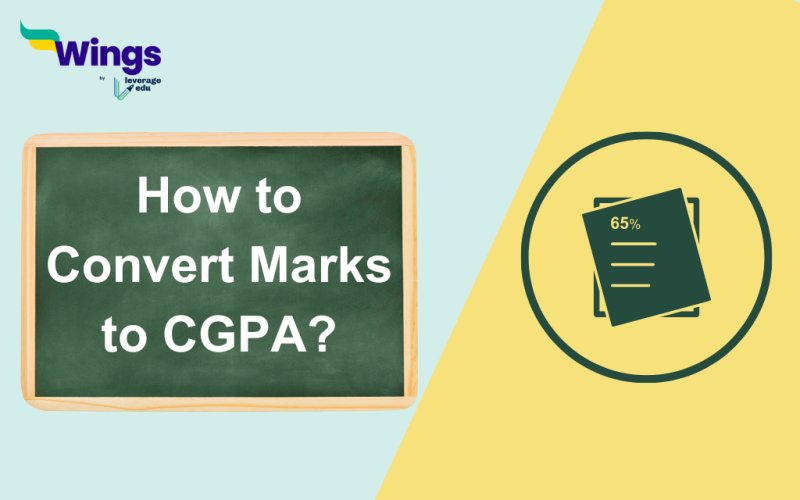Every year, millions of students appear in CBSE exams with their goal in mind to score the best marks possible. It is essential to score good marks at an institutional level to be able to secure admission to good institutions for higher education. Now, marks are required at different institutes in different formats. Some institutions accept in percentage while some accept in CGPA. Admission to institutes requires these grades to be converted into interchangeable formats, hence, it becomes essential to know the methods to do so. In this blog, we have provided the method to convert marks to CGPA. let’s explore this blog without any further ado.
Table of Contents
Check out our FREE CGPA to Percentage Calculator!
What is CGPA?
When it comes to CBSE, CGPA is a term that every student is familiar with. Especially at the 10th Class level, grades are provided in the form of CGPA.
CGPA means “Cumulative Grade Point Average” which measures the overall academic performance of the students throughout their entire academic program. CGPA is calculated by multiplying the grade points of respective courses by the number of credits and then dividing the sum by total credits. Unlike percentages, numbers are used to denote CGPA. For example:- if you get an ‘A grade’ in a subject, then the marks obtained would range between ‘90-95’, and your CGPA calculated would be ‘9’.
Also Read: Learn How to Convert CGPA to Marks
Marks to CGPA Conversion (Out of 4)
After knowing about CGPA, let’s now look at how to convert marks to CGPA. Now, this below-mentioned formula may vary depending on the grading system or the institution. Let’s have a look at the formula:-
Marks to Grade Points
Grade Points = Marks / 4
From this, you will obtain grade points. From the grade points, CGPA can be calculated.
| Marks | Grade Points |
| 90-100 | 10 |
| 80-89 | 9 |
| 70-69 | 8 |
| 60-59 | 7 |
| 50-49 | 6 |
| 40-39 | 5 |
| 30-29 | 4 |
| 20-19 | 3 |
| 10-0 | 2 |
Also Read: How to Calculate CGPA in Engineering?
Grade Points to CGPA
The method for calculating CGPA from grade points is mentioned below:-
- Grade points of each course need to be multiplied by the number of credits for the same.
- Now, add them both together.
- The sum of them now is to be divided by the total number of credits.
Simplified Method
- Step 1: Add the grade points i.e 9+8+7+8+8 = 40
- Step 2: Divide the sum by 5 i.e 40/5 = 8
- Thus, your CGPA is 8.0
Also Read: How to Prepare for UPSC in 6 Months?
Advantages and Disadvantages of CGPA
CGPA is used as a tool in the Indian education system to assess students’ performance in academics. Let’s have a look at the advantages as well as disadvantages of the same:-
Advantages of CGPA
- Since actual marks are not mentioned in it, hence, CGPA decreases the pressure of getting high marks.
- Students can spot their weak points and strong points and work on the same.
Disadvantages of CGPA
- CGPA gives a range of marks, hence it doesn’t show accurate performance.
- This gives students a chance to intentionally make mistakes because they know that they will be able to achieve their targeted grade.
Also Read: Difference Between GPA and CGPA
FAQs
Ans: To convert marks to CGPA:-
Marks to Grade Points
Grade Points= Marks / 4
From this, you will obtain grade points. From the grade points, CGPA can be calculated.
Grade Points to CGPA
The method for calculating CGPA from grade points is mentioned below:-
Grade points of each course need to be multiplied by the number of credits for the same.
Now, add them both together.
The sum of them now is to be divided by the total number of credits.
Simplified Method
Step 1: Add the grade points i.e 9+8+7+8+8 = 40
Step 2: Divide the sum by 5 i.e 40/5 = 8
Thus, your CGPA is 8.0
Ans: To get CGPA of 75 marks, we divide it by 9.5:-
75 / 9.5 = 7.89
Ans: To get a CGPA of 80 marks, we divide it by 9.5:-
80 / 9.5 = 8.42
Related Reads:-
While you’re filling out your admission application form for a university abroad, there are areas where you’ll have to convert marks to CGPA. Hence, you need to understand the basic formula to do the same. Follow Leverage Edu for more interesting reads on school education and study abroad.
 One app for all your study abroad needs
One app for all your study abroad needs













